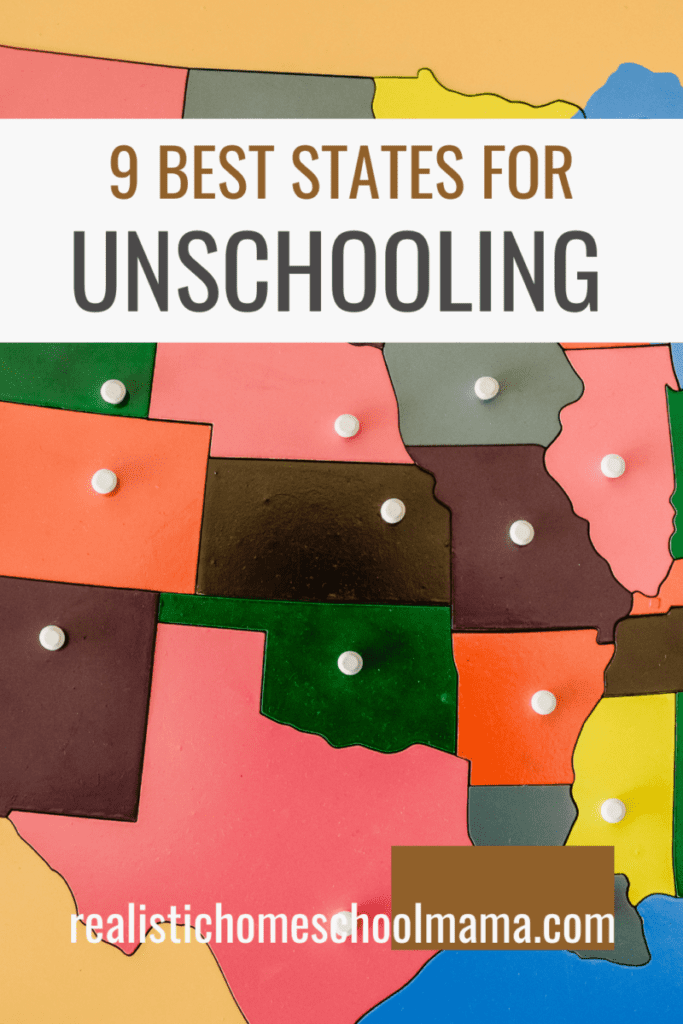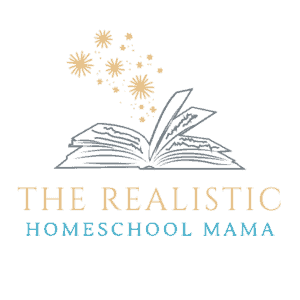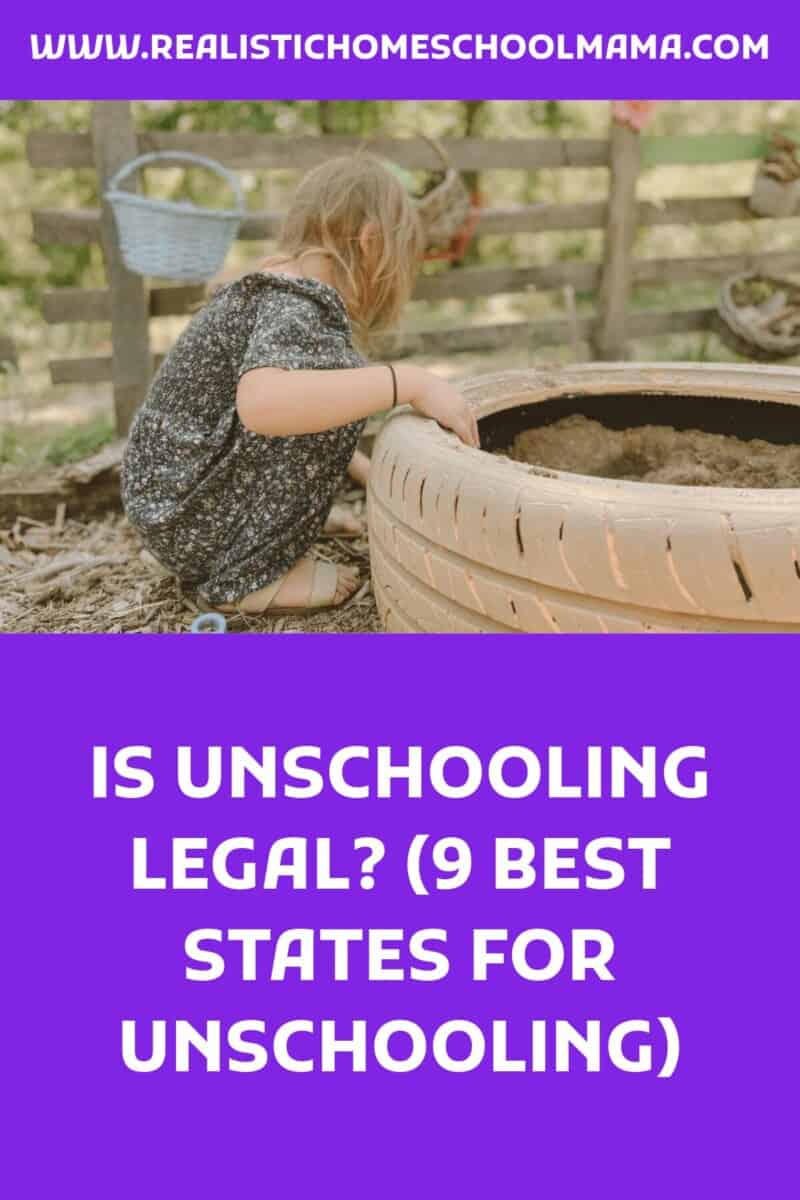Is Unschooling Legal in the United States?
Surely something called UNSCHOOLING isn’t actually legal, is it?? It sounds so,…intuitive…so freeing. It’s got to have some sort of legal restrictions on it, right?
So what gives? Is unschooling legal, or not?
Unschooling is a method of homeschooling, and as such is legal in all 50 States and U.S. Territories. From a legal standpoint, there is no law stating what method of schooling is legal, only that certain requirements be met within your chosen method. Therefore, you need to know and follow your states homeschooling laws.
Each state has different laws relating to homeschooling. For example, some states require testing, while others don’t. Some states require extensive paperwork, others don’t. And some states have almost no requirements at all!
What States is Unschooling Legal in?
Unschooling is a form of homeschooling, and homeschooling is legal in all 50 states.
While there are no official “unschooling laws,” the laws regarding homeschooling in general vary from state to state. These variations will most likely have an affect on how you choose to approach homeschooling.
Because of the large variance in the levels of regulation, some states are considered more “homeschooling-friendly” by parents than others.
The difference in laws, guidelines and regulations from state to state even leads some homeschooling families to relocate in search of a homeschool environment more supportive of their lifestyle.

Check out this blog post if you aren’t sure what unschooling is and would like to learn more about it.
Which State is Easiest to Unschool In?
Although opinions vary widely on how little or much regulation is good, almost every homeschool parent I’ve spoken to over the years feels that too much government regulation surrounding homeschool education inhibits their ability to make the best choices for their family.
Many parents find the some states laws suffocating and feel that they infringe on their freedom.
Overview of HSLDA categorization of homeschool regulation per state:
| States requiring no notice to the school district | States with high regulation | States with low regulation | States with moderate regulation |
|---|---|---|---|
| Alaska | Massachusetts | California | Hawaii |
| Connecticut | New York | Nevada | Washington |
| Idaho | Pennsylvania | Utah | Oregon |
| Illinois | Rhode Island | Arizona | Colorado |
| Iowa | Vermont | New Mexico | North Dakota |
| Michigan | Montana | South Dakota | |
| Missouri | Wyoming | Minnesota | |
| New Jersey | Nebraska | Louisiana | |
| Oklahoma | Kansas | Florida | |
| Texas | Arkansas | Ohio | |
| Wisconsin | Virginia | ||
| Kentucky | West Virginia | ||
| Mississippi | Tennessee | ||
| Alabama | North Carolina | ||
| Georgia | South Carolina | ||
| Delaware | New Hampshire | ||
| Maine | |||
| Maryland | |||
| Washington D.C. |
Here’s a quick rundown of what homeschooling is like in the “green” states -those with fewer regulations—often considered the better states for homeschooling.
9 Best States to Homeschool or Unschool In (aka the “Green” States)
1. Alaska
Children in Alaska must attend school between the ages of 7 and 16 or follow the state’s regulations for homeschooling. There are no requirements under the homeschool statute to notify the state, obtain approval, take exams, or be a licensed teacher.
2. Idaho
In contrast to some states, Idaho does not have any specific requirements for parents who choose to homeschool their children. They are also exempt from having to test their kids or get district approval. Furthermore, they are not required by law to divulge information about their homeschool program if their neighborhood school district requests it.
In Idaho, parents are required to choose an instructor for their children, who may be themselves, a relative, or even someone completely unrelated. Additionally, they must impart the necessary knowledge in subjects like language arts, math, science, and social studies.
3. Illinois
Homeschools are considered private schools in Illinois and therefore are not required to register with the Illinois State Board of Education. Additionally, they are not required to have their private homeschool recognized by the state.
Homeschool parents in Illinois are required to teach the required subjects, which include language arts, math, science, social studies, fine arts, and physical education and health. Instruction must take place in English and you must decide on a name of your homeschool.
4. Indiana
In Indiana, homeschooling parents are required to teach in English and deliver curriculum that is on par with that offered in public schools. However, the Indiana State Board of Education is not allowed to define what equivalent means and they cannot approve a homeschool program.
In Indiana, home schools are essentially regarded as private schools and are subject to the state’s private school statute. Additionally, they must maintain attendance records and run their homeschool for the equivalent number of days as the public school, which is typically 180 days.
5. Michigan
In Michigan, you are able to homeschool as a nonpublic school or under the homeschooling statute, or both. You are required to teach specific subjects but there is no regulation on how often or what grade level those subjects must be taught.
6. Missouri
In Missouri, the homeschool requirements are that you must maintain records for all children ages 7-16. Instruction must equal 1000 hours per year with 600 of those hours being core subjects. There is no requirement to provide notification upon beginning homeschooling.
7. New Jersey
New Jersey law requires only that you provide your child an education equal to that they would receive in public school.
8. Oklahoma
No testing or reporting requirements exist for homeschools in Oklahoma. The only requirement is that you maintain 180 days per year of homeschool instruction.
9. Texas
Texas homeschools are considered private schools. They must teach math, spelling, reading, grammer and good citizenship. They are also required to use some sort of written curriculum. An online program qualifies as a written curriculum.
Is Unschooling Abroad Legal?
If you live outside of the United States, much of the information in this post applies to you, as well. However, homeschooling laws vary drastically from country to country. There are several countries such as Spain, Costa Rica, Japan, Turkey, China, Sweden, and Greece -just to name a few- where homeschooling is pretty much not allowed.
There are also many countries that do allow homeschooling, on varying levels. A good place to do a quick check to see if homeschooling might be allowed in your country of residence is Wikipedia. Here’s a link to some info on International Homeschooling. Of course, be sure to also follow up with more formal local and regional requirements and laws to make sure the information you have is correct and that you are abiding by it fully.
How do I Unschool without Getting In Trouble?
I want to make it abundantly clear, that unschooling in the United States will NOT get you in trouble. It is 100% legal. However, not abiding by your specific states laws surrounding homeschooling CAN cause trouble.
Here are my top suggestions for making sure you don’t get into trouble by unschooling:
- Learn exactly what the laws in your state are. Search the internet, connect with an experienced homeschooler in your area, call the local school. And then, confirm all the information you have found with Official government websites. Don’t just take someone’s word for it.
- Find out who you need to contact in the school system in order to report to them about your unschooled child. Of course this is assuming that you live in a state that has legal requirements surrounding this. If you live in a homeschooling green state, you don’t need to worry about this step.
- Provide any necessary information to your local school. Depending on where you live this may vary. Some areas may require nothing at all well other areas may have more strict requirements and ask for things such as previous coursework, grade level and testing.
- Keep records as required by your state. For example we live in Missouri, and are required to keep records of our children’s school work and to meet certain hourly requirements per year. We don’t have to report these records anywhere, but we do need to keep them in case we are ever asked to show them.
- Get involved in your local and state government. Voting and working to change laws surrounding homeschool is vital. Attend school board meetings and help to educated people on the benefits of unschooling.
Check out my other posts about unschooling:
HOW DO UNSCHOOLERS LEARN TO READ?
DESCHOOLING VS UNSCHOOLING, WHAT’S THE DIFFERENCE?
11 WAYS UNSCHOOLERS LEARN MATH
Recent Posts
The freedom to educate our own children in the whatever method we see best suited to their needs is a freedom I do not take lightly, and am eternally grateful for. SO much is available to us, and...
There are a LOT of things about the Charlotte Mason method of homeschooling that appeal to me. However, the theory of intentionally developing good habits in your children is one that I admittedly...




